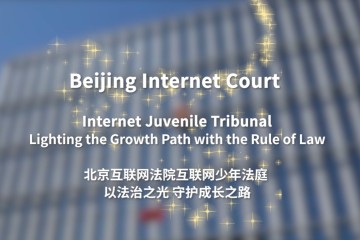BIC interprets personal information protection on CCTV
Zhang Wen, president of the Beijing Internet Court (BIC), together with two other BIC judges explained the Personal Information Protection Law by analyzing a case trialed by the BIC on two CCTV programs on Nov 1 and 2.
In 2019, the plaintiff Huang downloaded a reading app. During registration, Huang used his social app account, that was operated by the same company as the reading app to log on to the reading app. Then a message popped up to inform Huang that the reading app would require access to Huang's public information and friend list on his social app. Otherwise, Huang couldn't complete his registration and use it. Huang approved the request.
When using the reading app, Huang found that his friends' information from his social app appeared in the "follow" column of the reading app. Huang did not follow them on the reading app. In addition, regardless of whether they were "following" each other or not, the plaintiff Huang and his friends who also use the reading app could check each other's libraries, the book currently being read and reading notes. The plaintiff appealed to the court, claiming that the access mentioned above violated his personal information rights and right of privacy, and the developer and operator of the social app and the reading app should bear corresponding tort liability.
After the hearing, the BIC held that one's reading habits are a relatively special type of personal information, as they are related to personality interests to some extent. The reading app automatically added friends for its users, and the reading information shared between friends was open by default, which infringed on Huang's personal information-related rights and interests.
In the interview with CCTV, Zhang said the legal spirit of protecting personal information is implied behind the judgment of the reading app case.
"In judicial trials, we should pay attention to combining the legal spirit of protecting personal information with the protection of rights, conflicts of rights and infringement in the rapidly changing and complex environment of cyberspace, so as to better promote the benign development of the internet industry and the protection of people' rights and interests," Zhang added.

 Judicial White Paper
Judicial White Paper
 Play
Play Play
Play Online Lawsuit Guide
Online Lawsuit Guide Beijing Internet Court Lawsuit Service WeChat Account
Beijing Internet Court Lawsuit Service WeChat Account  Beijing Internet Court WeChat Account
Beijing Internet Court WeChat Account